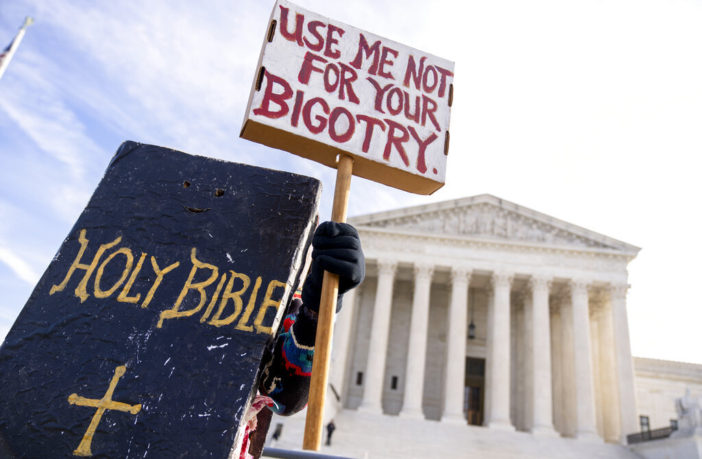By Gloria J. Browne-Marshall,
AFRO U.S. Supreme Court Correspondent
The U.S. Supreme Court recently heard a case that could turn back the clock on civil rights as we know it.
In 303 Creative LLC v. Elenis, Colorado website designer Lorie Smith objects to serving same-sex couples on her website and is suing for the right to decline service.
This case turns on whether Smith’s religious beliefs could allow her to refuse to design same-sex wedding websites, without violating Colorado’s Anti-Discrimination Act. Conservatives seemed to defend her actions. Justice Ketanji Brown Jackson raised concerns about using religious beliefs as a shield to discriminate based on race.
Conservative organization, Alliance Defending Freedom, sued Aubrey Elenis, director of the Colorado Civil Rights Division, creating a case challenging Colorado’s law protecting LGBT rights. Public accommodations laws require businesses to serve the public equally and without discrimination. Smith wants an exemption from the law.
“The central dispute here is what the public accommodations law targets when they require a business to provide equal access to its services,” said Eric Olson, attorney for Colorado.
Many queer rights organizations are fearful. If the Court rules in favor of the web designer’s religious beliefs, it could undermine LGBT rights, especially same-sex marriage. The 2015 case, Obergefell v. Hodges, upheld the right of same sex couples to marry.
During oral arguments, the justices raised questions and hypothetical examples ranging from religion to race, gender, and history. If decided in favor of Smith, Justice Jackson raised a scenario where a mall could “have a sign next to the Santa that says, ‘only White children.’” She turned to Smith’s attorney. “Why isn’t your argument that they should be able to do that?” While Justice Sonia Sotomayor wondered how far businesses could regress in favor of religious free speech without leading to segregation and anti-miscegenation.
Justice Sotomayor asked if a business owner could say, “I don’t believe Black people and White people should get married?” A photographer could refuse to photograph corporate women because their religion did not believe in female leaders. Throughout the Court’s argument, race was used as a measure for impermissible discrimination in public accommodations. The fight for racial justice has been bloody and centuries long. But, at one point during the oral argument, Justice Samuel Alito added a sarcastic remark about Black children wearing Ku Klux Klan outfits.
There is no legal determination or evidence needed to prove religious sincerity. All one has to say is that this is their religious belief, without ever attending religious services. Supreme Court decisions are supposed to give consistency to federal and state courts. Businesses need to apply anti-discrimination laws and everyday people must know their rights are protected.
Conservatives on the Court did not appear to present any consistent legal reasoning. This Supreme Court’s conservative supermajority may have taken this case to continue its march against all other rights using religion as its legal weapon.
Religious beliefs placed before all other rights runs counter to the Constitution and the core convictions of the framers who wrote it in 1787. One can practice any religion. But this country has no established religion as set forth in the Establishment Clause in the First Amendment. Yet, the U.S. Supreme Court’s past cases regarding the Affordable Care Act and adoption raises religious preferences in a hierarchy of rights that the Framers never envisioned.
This conservative led Court seems intent on a patriarchy of White upper-class straight male dominance reflecting an early America where racial segregation and oppression reigned, leaving most to eat crumbs from the table of justice. This case could be decided by June of 2023.
___________________________________
Gloria J. Browne-Marshall is the U.S. Supreme Court Correspondent for the AFRO American Newspapers and author of “She Took Justice: The Black Woman, Law, and Power.”
Help us Continue to tell OUR Story and join the AFRO family as a member –subscribers are now members! Join here!



